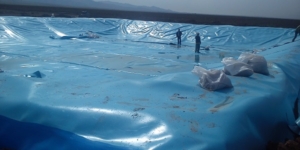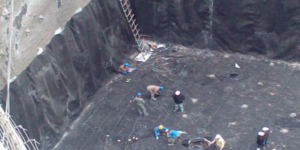Agricultural Pool(water storage pool)
A water storage pool is a large pool on the ground. It is necessary to build it due to the collection of seasonal water so that this water stored in the rainy and dry seasons can be used for agriculture and livestock. These pools have inlets to regulate the inflow and outflow to drain excess water.

Applications:
One of the important applications of agricultural pools is irrigation of agricultural lands, gardens and livestock. These pools can be used to irrigate agricultural products, create an environment for aquaculture or animal husbandry.
Water storage pools can also provide a suitable and sustainable source of water storage for cities and villages. Aquatic animals such as fish, oysters, aquatic plants or algae can be raised in these ponds.
These pools can be used not only for the mentioned purposes, but also for recreational and beauty purposes in the yard, garden or farm. Construction of recreational lakes, fishing and boating are other uses of such pools.

Water storage pool insulation methods
Sealing with lime and clay
Disadvantages:
Building a pool with this type of insulation has been very time consuming
It can not provide a completely uniform surface against leakage
The soil of the pool floor should be saturated when spraying lime so that it can hydrate the lime well, and the lime processing operation should be done while maintaining the moisture content of the lime.
No water is added immediately after the sealing operation is completed and the lime should be given time to complete setting.
This should be done slowly when adding water to the pool. Because turbulent currents can damage the sealing layers.
Never keep the pool completely dry. Because the drying of the pool causes flax cracks in the layers, which causes leakage from the body and floor of the pool. After a crack occurs, the water holding capacity decreases.
Sealing with bentonite
Disadvantages:
Because bentonite particles are so tiny, when they are spread on the pool, the particles can be released into the air and
Bentonite blanket method enter the lungs through respiration, so a mask must be used to prevent the particles from reaching the lungs.
This method should not be used in hot weather.
Disadvantages:
All debris should be removed from the pool floor.
Water should be carefully introduced into the pool so as not to disturb and destroy the bentonite.
Appropriate depth of compacted soil should be created.
Proper soil compaction should be achieved by bringing soil moisture to optimum moisture.
Sealing pools made of concrete
Disadvantages:
Epoxy coatings are brittle. For this reason, if the concrete pool has small cracks, these cracks will cause the epoxy coating to break at the crack site.
Another disadvantage of these coatings is their high price compared to other sealing materials.


